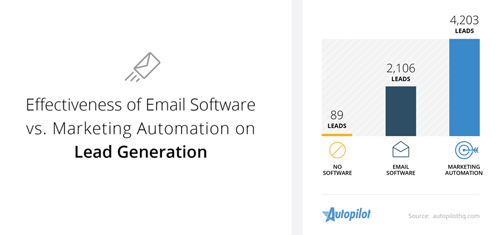There are hundreds upon hundreds of companies in the marketing technology landscape (see for yourself). Of the many categories, marketing automation is expected to be a 1.9 billion dollar industry by 2020. However, some of you may still be asking if it’s truly worthwhile to invest in an email marketing automation tool. On the other hand, perhaps you have purchased a platform, but you are debating whether or not it’s really bringing value. Wonder no more – from enhanced company performance to more qualified sales leads, email marketing automation has delivered favorable results for many different companies.
Performance
1.) 79% of top-performing companies have been using marketing automation for more than 2 years. (Source: Gleanster)
2.) 58% of top-performing companies (defined as those where marketing contributes more than half of the sales pipeline), have adopted marketing automation. (Forrester Research)
3.) Best-in-class companies (companies who are performing at the highest performance level in their particular industry) are 67% more likely to use a marketing automation platform. (Aberdeen Group)
4.) 78% of successful marketers say that marketing automation is most responsible for improving revenue contribution. (The Lenskold Group, 2013).
5.) Companies that use marketing automation are 3 times more likely than companies without automation to track and attribute their content-marketing efforts to multiple touchpoints (36% to 11%). (Lenskold and Pedowitz)
6.) Marketing automation drives a 14.5% increase in sales productivity and a 12.2% reduction in marketing overhead. (Nucleus Research)
Lead Generation
7.) Effectiveness of Email Software vs. Marketing Automation on Lead Generation (Source: Autopilot)

8.) Businesses that use marketing automation to nurture prospects experience a 451% increase in qualified leads. (The Annuitas Group, 2014)
9.) The #1 benefit of marketing automation according to B2B marketers is the ability to generate more and better quality leads. (Pepper Global)
10.) 35% of companies with marketing automation regularly capture intelligence for the sales team (from their content marketing efforts), compared with 19% of companies without marketing automation systems. (The Lenskold and Pedowitz Groups)
11.) CMOs at top-performing companies indicate that their most compelling reason for implementing marketing automation is to increase revenue (79%) and to get higher quality leads (76%). (Gleanster)
Company Growth
12.) Companies using marketing automation see 53% higher conversion rates from initial response-to-MQL and a revenue growth rate that is 3.1% higher than non-users. (Source: Aberdeen Group)
13.) Marketing automation has seen the fastest growth of any CRM-related segment in the last 5 years. (Source: Focus Research)
14.) Monthly Google searches for the term “marketing automation” have grown by 22% in the past year, from an average of 12,100 in February 2014, to 14,800 in January 2015. (Google Keyword Planner)
15.) B2B marketers who implement marketing automation software increase their sales pipeline contribution by an average of 10%. (Forrester Research)
16.) 63% of companies that are outgrowing their competitors use marketing automation. (Lenskold and Pedowitz)
17.) Companies that automate lead management see a 10% or greater increase in revenue in 6-9 months. (Source: Gartner Research)
At the end of the day, marketing automation helps make your processes more efficient, while giving you the extra boost you may need to pull ahead of the competition. For more on this topic, be sure to check out Why Do I Need Marketing Automation?


Thanks for the post! We’re considering trying out GetResponse for marketing automation. I guess that with a good strategy it can’t be too difficult to manage.